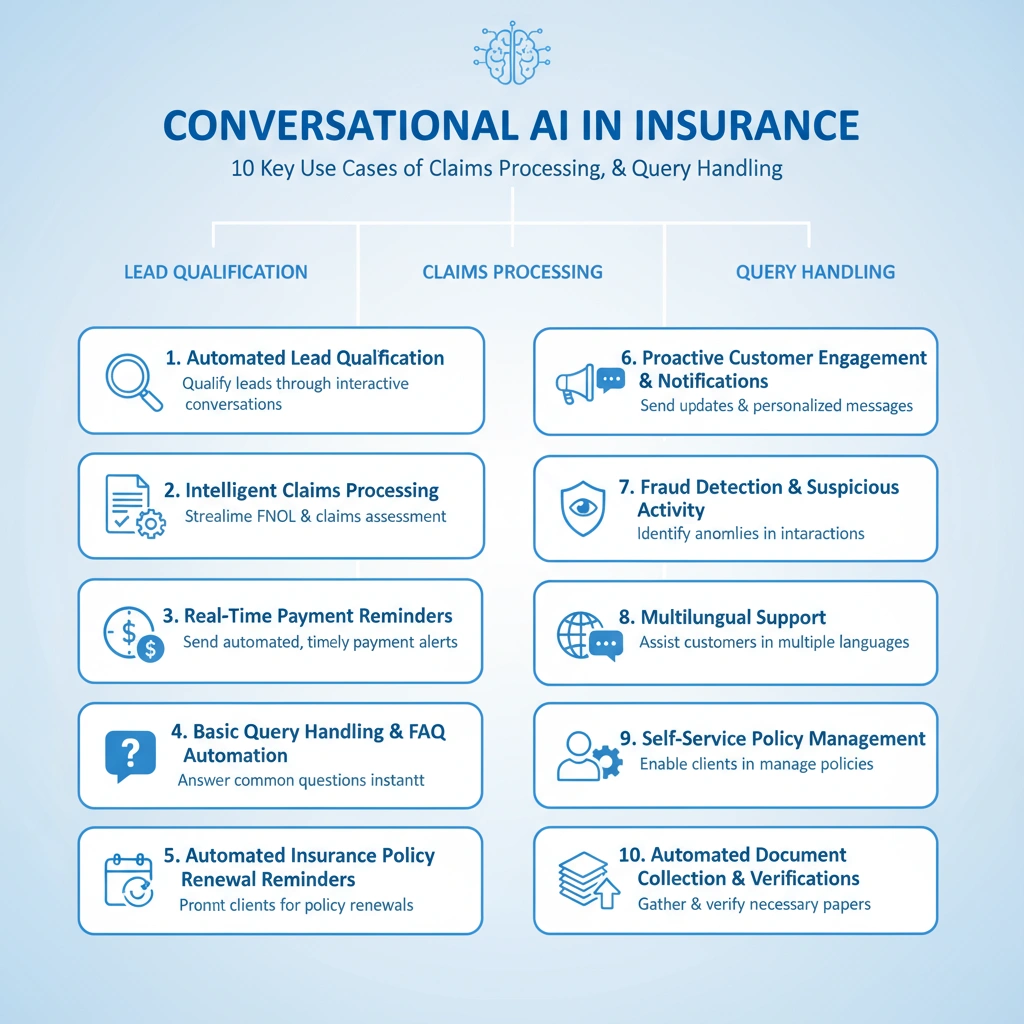Conversational AI in Insurance is revolutionizing the sector by automating core workflows, enhancing customer experience, and empowering agents with real-time intelligence. Leading insurers utilize this technology to streamline claims processing, qualify leads more efficiently, and deliver personalized support effectively.
Convin’s Voicebots in insurance industry operations and AI-powered quality assurance significantly reduce costs while boosting compliance and service excellence.
Conversational AI in Insurance refers to AI-powered digital agents that engage customers via natural language, automating claims, support, and policy management with personalized, real-time interactions across voice and chat channels.
Let’s break down 10 impactful use cases that are driving measurable business outcomes across the insurance value chain today.
Scale your call center without adding staff with Convin.
Introduction to Conversational AI in Insurance
The insurance industry is undergoing a pivotal transformation through innovative digital technologies. Conversational AI in Insurance is at the forefront, revolutionizing how insurers interact with customers and manage operations.
This technology enables human-like, automated conversations via natural language processing (NLP), machine learning, and voice recognition.
The result is faster, more personalized service that enhances policyholder satisfaction and cuts operational costs for AI insurance companies. Conversational AI empowers insurers to automate repetitive tasks, support agents in real-time, and streamline processes from claims to customer support.
Transitioning from foundational digital efforts, insurers now focus on impactful use cases of conversational AI that directly improve business outcomes and customer experiences.
Supercharge agent decisions using Convin’s real-time assistance tool.
Conversational AI in Insurance Customer Support
The backbone of customer engagement in any AI-driven insurance company is efficient and timely support. Conversational AI in Insurance elevates customer service by automating routine interactions and enabling voicebots in the insurance industry to manage high call volumes without compromising quality.
Streamlining Policyholder Inquiries
Managing policyholder inquiries swiftly and accurately is critical. Conversational AI customer support solutions for insurance handle a wide range of requests, including policy details, renewals, coverage questions, and payment updates.
- 77% of insurers deploy conversational AI to improve first-contact resolution and reduce hold times.
- Convin’s voicebots resolve over 80% of routine policy queries instantly, decreasing call center load.
This automation enables customers to access information at any time without waiting. It drastically reduces agent caseloads, freeing human staff to handle complex issues.
This capability is essential for coping with rising digital expectations and serving global policyholders 24/7.
Efficient handling of routine policyholder inquiries enhances customer loyalty and operational efficiency, laying the groundwork for advanced use cases.
Personalized Recommendations and Assistance
Beyond answering queries, personalization delivered by conversational AI for insurance agent tools enhances policyholder loyalty. AI analyzes customer data to recommend relevant add-ons, upgrades, and coverage changes.
- Personalized upsell campaigns achieve 20% higher conversion rates via conversational AI-driven product suggestions.
- Real-time agent assist from Convin enhances call outcomes by delivering contextual prompts and customer insights during conversations.
This level of personalized service increases customer engagement and trust, critical drivers for retention in competitive markets.
As support automation matures, insurers shift focus to broader operational improvements enabled by conversational AI.
Capture leads faster with Convin’s intelligent Lead Qualification AI.
This blog is just the start.
Unlock the power of Convin’s AI with a live demo.

Use Cases of Conversational AI in Insurance
Conversational AI in Insurance tackles key operational bottlenecks, including lead qualification, claims automation, and customer self-service solutions. What are the main use cases for conversational AI in insurance? AI solutions in insurance expand beyond support, fueling growth and efficiency at scale.

- Automated Lead Qualification and Engagement
Lead qualification is a significant challenge for AI insurance companies. Conversational AI quickly evaluates prospects and routes qualified leads to specialized agents, ensuring faster engagement and conversion.
- Automation increases lead conversion rates by 25% while lightening agent workloads.
- Convin’s lead qualification solution captures and scores leads in real-time, sending high-value ones directly to agents.
Timely and targeted follow-up enhances pipeline effectiveness and sales velocity.
This use case exemplifies how conversational AI in insurance nurtures growth through operational speed and accuracy.
- Intelligent Claims Processing and Status Updates
Claims remain the centerpiece of insurer operations and a source of customer frustration. Conversational AI for claims processing automates claim initiation, document submissions, and real-time status tracking for claimants.
- Leading AI insurance company platforms automate up to 95% of standard claims.
- Claims resolution times shrink dramatically, reducing days to minutes for straightforward claims.
Fraud detection algorithms embedded in conversational AI monitor claim integrity, flagging suspicious cases for review, mitigating loss exposure.
In parallel, many teams automate intake with claims document parsing to reduce manual field entry and verification delays.
Convin’s voicebots can assist claimants instantly, guiding them through processes with empathy and reducing the burden on human agents.
Customer satisfaction and operational costs improve substantially with conversational AI-led claims management.
- Real-Time Payment Reminders and Collection
Premium payment adherence is crucial for an insurer's financial health. Automated payment reminder conversations maintain payment discipline, minimizing lapses and churn.
- Payment reminder automation cuts overdue premiums by 35% and improves collection efficiency.
- Convin voicebots manage proactive, personalized payment conversations that reduce friction and support multiple payment options.
This empowers insurers to maintain steady cash flow while enhancing policyholder convenience.
Automated payment collection using conversational AI fortifies revenue assurance and strengthens customer relationships.
- Basic Query Handling and FAQ Automation
Routine customer questions about coverage, billing, or process steps consume agent time unnecessarily. Conversational AI chatbots handle these FAQs at scale.
- Automation of FAQs increases agent availability for complex issues by 40%.
- Convin’s conversational AI insurance customer support system manages thousands of queries without wait times, improving Net Promoter Scores.
Fast, accurate answers to simple questions reduce frustration and elevate overall service quality.
This classic use case is foundational for insurers seeking huge efficiency gains from conversational AI solutions in insurance.
- Automated Insurance Policy Renewal Reminders
Automating renewal reminders is vital to prevent policy lapses and retain customers. AI-powered voicebots conduct outbound calls and send messages to notify policyholders of upcoming renewals.
These conversational AI insurance customer support solutions ensure consistent, timely communication across languages and time zones.
- Convin’s AI Phone Calls handle thousands of renewal reminders without human intervention, resulting in a 50% reduction in operational costs.
- Renewal automation enhances retention by offering policyholders clear options and convenient online or phone renewal pathways.
This use case reduces manual agent workload and protects revenue, making renewals seamless and efficient for both insurers and customers.
- Proactive Customer Engagement and Notifications
Conversational AI enables proactive outreach for important policy-related alerts. Customers receive notifications for payment due dates, coverage changes, or new discount programs.
Proactive engagement reduces missed deadlines and increases customer lifetime value.
- AI bots utilize natural, personalized language to engage policyholders, resulting in over a 30% increase in engagement rates.
- Convin integrates CRM data for tailored notifications, enhancing policyholder satisfaction and reducing churn.
By anticipating customer needs, conversational AI in insurance builds trusted, proactive relationships.
- Fraud Detection and Suspicious Activity Monitoring
Conversational AI platforms incorporate fraud detection algorithms to identify irregular patterns during claims or customer interactions.
Bots flag suspicious claims or policy changes for further investigation, assisting human teams in their review.
- Early detection saves millions by preventing fraudulent payouts and maintaining insurer profitability.
- Integrated conversational AI streamlines fraud response times while maintaining a seamless customer experience.
Fraud detection embedded in conversational AI ensures secure, trustworthy insurance operations.
- Multilingual Support for Diverse Policyholders
Conversational AI voicebots communicate in multiple languages, breaking language barriers in global markets.
This inclusivity broadens access and enhances satisfaction for non-English-speaking policyholders.
- Multilingual conversational AI insurance customer support tools handle complex queries accurately in preferred languages.
- Convin’s voicebots provide fluent, empathetic assistance, expanding insurer reach worldwide.
Multilingual support enhances accessibility and loyalty across diverse customer bases.
- Self-Service Policy Management and Updates
Conversational AI enables customers to update their personal information, add beneficiaries, or modify coverage without requiring agent assistance. Self-service workflows improve agility for busy policyholders.
- AI chatbots handle millions of policy management requests daily, freeing agents from routine tasks.
- Convin’s solutions integrate seamlessly with insurer backends for secure, real-time updates.
Self-service elevates customer control while lowering operational friction.
- Automated Document Collection and Verification
Collecting required documents for claims or underwriting is often a bottleneck. Conversational AI automates document requests and verifies submissions via OCR and AI validation.
- Policyholders upload documents directly through chatbot prompts, reducing delays and errors. Integrating secure file uploading services ensures seamless, reliable document transfer between customers and insurers, further improving processing speed and data accuracy.
- Convin AI’s automation accelerates processing times with high accuracy for compliance checks.
Automated document handling streamlines complex workflows, improving experience and efficiency.
As conversational AI streamlines key insurance functions, such as lead qualification, claims processing, and query handling, insurers are now leveraging this technology to enhance agent effectiveness and ensure consistent service quality.
Real-time agent assist tools provide immediate support during customer interactions, while automated quality assurance enables continuous monitoring and improvement.
Together, these advanced AI capabilities enable agents to resolve issues more quickly, maintain compliance, and deliver an enhanced customer experience.
This shift marks the evolution from operational automation to intelligent augmentation of the human workforce in insurance.
Slash claims processing times with Convin’s AI-powered automation.
Convin for Conversational AI in Insurance
Enhancing agent performance and ensuring service quality are key enablers for sustained insurance success. Conversational AI in Insurance provides real-time assist tools and robust quality assurance automation.
Real-Time Agent Assist
Convin’s Real-time agent assist is a game-changing conversational AI capability that supports insurance agents during live customer interactions. This technology listens to the conversation, transcribes it, and provides instant, context-aware suggestions.
Agents receive prompts for relevant policy details, personalized recommendations, and compliance reminders without interrupting the flow. This AI augmentation reduces average handle time and empowers agents to resolve queries more accurately and confidently.
Key features include:
- Instant access to customer history and preferences
- Compliance check prompts to avoid regulatory breaches
- Suggested responses based on conversation context
- Real-time escalation alerts for critical issues
Convin’s real-time agent assist solution has demonstrated productivity boosts of up to 40%, improving both customer satisfaction and agent confidence.
By enhancing agent capabilities, conversational AI in Insurance drives faster resolutions and higher quality service delivery, a critical advantage in competitive markets.
Contact Center Automated Quality Assurance
Convin’s Automated quality assurance revolutionizes insurance contact centers by continuously monitoring all customer interactions using conversational AI.
This system analyzes calls and chats, detecting compliance risks, service gaps, and coaching opportunities.
Unlike traditional manual QA, automated solutions provide 24/7 unbiased evaluations across thousands of interactions, enabling scalable, data-driven improvements.
Benefits of automated quality assurance include:
- 30% higher accuracy in call assessments compared to manual reviews
- Real-time flagging of compliance violations and risk exposures
- Detailed insights into agent performance trends and customer pain points
- Automated generation of reports to guide coaching and training
Convin’s AI-powered quality assurance guarantees audit-ready compliance documentation and actionable feedback.
This helps insurance companies maintain regulatory standards, continuously elevate customer experience, and improve operational efficiency with less human effort.
Automated quality assurance using conversational AI creates a resilient, high-performing insurance workforce.
The Future of Conversational AI in Insurance
Conversational AI in Insurance is redefining how insurers operate and engage customers. The technology’s ability to automate 10 critical use cases, ranging from customer support to claims processing, lead qualification, and agent assistance, is revolutionizing the insurance industry.
Voicebots in the insurance industry and AI solutions in insurance companies are now indispensable tools for scalability, speed, and trust-building. Executive leaders should prioritize the implementation of conversational AI to enhance customer experience, operational efficiency, and long-term business resilience.
By embracing conversational AI in Insurance, companies unlock new levels of agility, productivity, and customer loyalty essential for competitive success in 2025 and beyond.
Book your Convin demo today!
FAQs
- How long does it take to deploy conversational AI across insurance operations?
Deployment typically spans 3 to 6 months, including needs assessment, integration with legacy systems, AI model training, and pilot testing. Continuous optimization is recommended after launch for optimal results.
- What data privacy regulations affect conversational AI insurance deployments?
Conversational AI must comply with GDPR, HIPAA, PCI DSS, and local data residency laws. Robust encryption, consent management, and audit trails protect sensitive customer information throughout AI interactions.
- Which legacy insurance systems integrate best with conversational AI platforms?
Conversational AI integrates effectively with policy administration systems (PAS), claims management, CRM, and billing platforms, especially when supported by APIs or middleware for seamless data exchange.
- How do insurers measure ROI from conversational AI investments?
ROI evaluation uses KPIs like reduced average handle time, increased first-call resolution, lead conversion rates, cost savings from automation, and improvements in customer satisfaction scores.
- What technical expertise is required to manage conversational AI in insurance?
Teams need AI specialists, data scientists, integration engineers, and compliance experts to train models, manage data pipelines, ensure system security, and continuously improve AI performance.





.webp)


.avif)